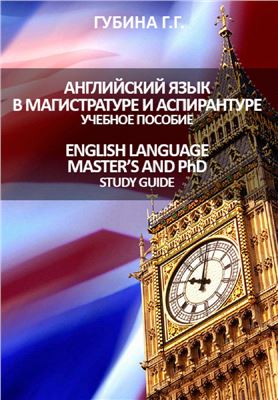Учеб. пособие – Ярославль: Изд-во ЯГПУ, 2010 – 128 с. – ISBN
978-5-87555-608-1
Учебное пособие представляет собой практический курс английского
языка для магистров и аспирантов вузов всех специальностей. Уровень
овладения английским языком – высокий (Advanced). Методическая
значимость и новизна пособия заключается в представлении стратегий
послевузовского изучения иностранного языка в магистратуре и
аспирантуре на основе современных стандартов компетентностного
подхода в процессе формирования специалистов, на высоком уровне
владеющих иностранным языком. В пособии представлено большое
количество текстов и упражнений, содержащих стратегии обучения
иностранному языку, позволяющих магистрам и аспирантам овладеть
методикой самостоятельной работы послевузовского изучения
иностранного языка. Справочные материалы обеспечены глоссарием,
содержащим методические и общие термины, и ключами к курсу
обучения.
Содержание
Preface
Start Leaing
Why do we choose postgraduate studies?
Postgraduate programs and research degrees
Types of postgraduate programs
Reference skills: the card catalogue
Check yourself Units 1-4
Listening skills
Making a speech
Strategies to testing: standardized tests
Vocabulary tests: synonyms and antonyms; base words; root words; prefixes, suffixes; clipped words (shortening); blended words; words from sounds; borrowed words
Check yourself Units 5-8
Vocabulary tests: homophones, homographs, analogies, completion sentence tests: word meaning items
Reading comprehension tests
Tests of standard written English
Précis
Check yourself Units 9-12
Abstract
Writing a research report: main ideas
Writing supporting details in a research report: description
Writing supporting details in a research report: expository writing
Check yourself Units 13-16
Writing supporting details in a research report: using strategies to persuade
Abstract of thesis
Strategies to prewriting the research paper: introduction to the research paper, discovering subjects, choosing and limiting a subject, gathering information, analyzing, evaluating sources
Strategies to prewriting the research paper: developing the working thesis statement, taking notes, summarizing, organizing your notes, outlining
Strategies to writing the research paper: drafting, revising, editing, publishing
Check yourself Units 17-21
Keys
Glossary
Start Leaing
Why do we choose postgraduate studies?
Postgraduate programs and research degrees
Types of postgraduate programs
Reference skills: the card catalogue
Check yourself Units 1-4
Listening skills
Making a speech
Strategies to testing: standardized tests
Vocabulary tests: synonyms and antonyms; base words; root words; prefixes, suffixes; clipped words (shortening); blended words; words from sounds; borrowed words
Check yourself Units 5-8
Vocabulary tests: homophones, homographs, analogies, completion sentence tests: word meaning items
Reading comprehension tests
Tests of standard written English
Précis
Check yourself Units 9-12
Abstract
Writing a research report: main ideas
Writing supporting details in a research report: description
Writing supporting details in a research report: expository writing
Check yourself Units 13-16
Writing supporting details in a research report: using strategies to persuade
Abstract of thesis
Strategies to prewriting the research paper: introduction to the research paper, discovering subjects, choosing and limiting a subject, gathering information, analyzing, evaluating sources
Strategies to prewriting the research paper: developing the working thesis statement, taking notes, summarizing, organizing your notes, outlining
Strategies to writing the research paper: drafting, revising, editing, publishing
Check yourself Units 17-21
Keys
Glossary

